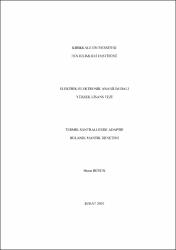| dc.contributor.advisor | Sevinç, Ata | |
| dc.contributor.author | Bütün, Murat | |
| dc.date.accessioned | 2021-01-16T19:12:23Z | |
| dc.date.available | 2021-01-16T19:12:23Z | |
| dc.date.issued | 2010 | |
| dc.identifier.uri | | |
| dc.identifier.uri | https://hdl.handle.net/20.500.12587/16778 | |
| dc.description | YÖK Tez ID: 259171 | en_US |
| dc.description.abstract | Enerji santralleri üretim aşamalarında çeşitli iç ve dış bozucu faktörlerden etkilenmektedir. Termik santrallerde klasik kontrol sistemlerinin, parametre değişimlerine ve bozucu etkilere karşı performansları, yeni kontrol sistemlerine oranla her zaman istenen düzeyde olamamaktadır. Teknolojinin ilerlemesiyle birlikte enerji santrallerinin güçlerinin büyümesi ve daha kompleks santral yapılarının oluşmasıyla optimal, esnek kontrol sistemlerine ihtiyaç artmaktadır.Günümüzde birçok farklı kontrol yöntemleri kullanılmakta ve geliştirilmektedir. Bu tez çalışmasında bir termik elektrik santralinin güç ve entalpi çıkışlarının bulanık mantık PI ve klasik PI yöntemleriyle kontrol edildiği fakat ölçümlerin ideal ve girişlerin sınırsız varsayıldığı önceki bazı çalışmalar, sınırlayıcı ve bozucu etkiler modellere dahil edilerek tekrarlanmıştır. Simülasyon sonuçları, bulanık mantık PI kontrolörün işletme şartları altında, ani referans değişimlerine verdiği hızlı cevaplarla diğer kontrolörden daha iyi bir performansa sahip olduğunu doğrulamıştır. Sınırlı giriş ve gürültülü ölçümlerle sağlanan bu performans, yöntemlerin gerçekçiliğini ortaya koymuştur. Daha sonra, sistemde meydana gelebilecek değişimler düşünülerek adaptif denetim uygulanmıştır. Burada da modele sınırlayıcı ve bozucu etkiler katılmıştır. Adaptif denetim, bazı parametreleri tahmin ettiği için, işletme şartlarında (kazan kirlenmesi v.b.) zaman içerisinde oluşabilecek bazı değişimlere uyum sağlayabilecek yapıdadır. Adaptif denetimde, gürültülü ölçüm ve sınırlı girişler altında bazı parametreler doğru tahmin edilmiş ve bu tahminler kullanılarak istenilen kontrol sağlanmıştır. Bu adaptif denetimde parametre tahminleri projeksiyon algoritmasıyla yapılmıştır. Sistem denetimi ise, ayrı ayrı hem bulanık mantık PI, hem de klasik PI yöntemleriyle gerçekleştirilmiştir. Simülasyon sonuçları bulanık mantık PI kontrolörün, klasik PI kontrolöre göre adaptif kontrolde de referanslardaki değişimlere daha hızlı cevap verdiğini ve daha iyi bir performansa sahip olduğunu göstermektedir.Anahtar Kelimeler : Termik Güç Santrali Kontrolü, Adaptif Bulanık Mantık Kontrolü, Kazan Kontrolü, Adaptif Termik Santral Kontrolü. | en_US |
| dc.description.abstract | Power plants are affected by various internal and external disturbances during production stages. In thermal power plants, the performance of conventional control systems against parameter variations and disturbances are not always as good as desired when compared to newer control systems?. There is an increasing need for flexible control systems that incorporate several optimums as the power plants continuously get larger in installed capacity, and more complicated in technology.Many control systems are being used and evaluated nowadays. In this study, some recent studies where power and enthalpy outputs of a thermal power plant are controlled with fuzzy logic PI and conventional PI methods assuming ideal measurements and unlimited inputs have been repeated including the disturbance and limiting effects into the models. Simulation results have verified that fuzzy PI controller has a better performance with a quicker response than the other to sudden reference changes under operating conditions. The performance achieved under limited entries and noisy measurements has shown the practicability of the methods. Then, considering the possible variations in the system, adaptive control has been implemented. Again, the disturbance and limiting effects have been added into the models. Since it estimates some of the parameters, the adaptive control copes with some possible variations in the system under operating conditions during time like boiler inquination. In the adaptive control, some parameters have been correctly estimated under limited inputs and noisy measurements and desired control has been achieved utilizing these predictions. The parameter predictions in the adaptive control have been performed with projection algorithm. The system control has been realized both by fuzzy logic PI and conventional PI methods. Simulation results show that the fuzzy logic PI has a better performance than its conventional counterpart, responding more rapidly to the reference variations in the adaptive control too.Keywords: Thermal Power Plant Control, Adaptive Fuzzy Logic Control, Boiler Control, Adaptive Thermal Plant Control. | en_US |
| dc.language.iso | tur | en_US |
| dc.publisher | Kırıkkale Üniversitesi | en_US |
| dc.rights | info:eu-repo/semantics/openAccess | en_US |
| dc.subject | Elektrik ve Elektronik Mühendisliği | en_US |
| dc.subject | Electrical and Electronics Engineering ; Enerji | en_US |
| dc.subject | Energy | en_US |
| dc.subject | | en_US |
| dc.subject | | en_US |
| dc.subject | | en_US |
| dc.subject | | en_US |
| dc.subject | | en_US |
| dc.title | Termik santrallerde adaptif bulanık mantık denetimi | en_US |
| dc.title.alternative | Adaptive fuzzy logic control in thermal power plants | en_US |
| dc.type | masterThesis | en_US |
| dc.contributor.department | KKÜ, Fen Bilimleri Enstitüsü, Elektrik-Elektronik Mühendisliği Anabilim Dalı | en_US |
| dc.identifier.startpage | 1 | en_US |
| dc.identifier.endpage | 100 | en_US |
| dc.relation.publicationcategory | Tez | en_US |
















